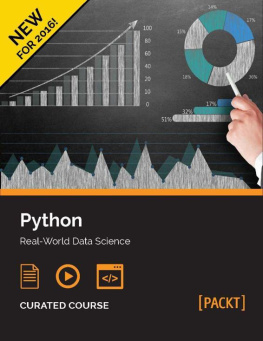Gopi Subramanian - Python Data Science Cookbook
Here you can read online Gopi Subramanian - Python Data Science Cookbook full text of the book (entire story) in english for free. Download pdf and epub, get meaning, cover and reviews about this ebook. year: 2015, publisher: Packt Publishing, genre: Home and family. Description of the work, (preface) as well as reviews are available. Best literature library LitArk.com created for fans of good reading and offers a wide selection of genres:
Romance novel
Science fiction
Adventure
Detective
Science
History
Home and family
Prose
Art
Politics
Computer
Non-fiction
Religion
Business
Children
Humor
Choose a favorite category and find really read worthwhile books. Enjoy immersion in the world of imagination, feel the emotions of the characters or learn something new for yourself, make an fascinating discovery.

- Book:Python Data Science Cookbook
- Author:
- Publisher:Packt Publishing
- Genre:
- Year:2015
- Rating:4 / 5
- Favourites:Add to favourites
- Your mark:
Python Data Science Cookbook: summary, description and annotation
We offer to read an annotation, description, summary or preface (depends on what the author of the book "Python Data Science Cookbook" wrote himself). If you haven't found the necessary information about the book — write in the comments, we will try to find it.
Over 60 practical recipes to help you explore Python and its robust data science capabilities
About This Book- The book is packed with simple and concise Python code examples to effectively demonstrate advanced concepts in action
- Explore concepts such as programming, data mining, data analysis, data visualization, and machine learning using Python
- Get up to speed on machine learning algorithms with the help of easy-to-follow, insightful recipes
This book is intended for all levels of Data Science professionals, both students and practitioners, starting from novice to experts. Novices can spend their time in the first five chapters getting themselves acquainted with Data Science. Experts can refer to the chapters starting from 6 to understand how advanced techniques are implemented using Python. People from non-Python backgrounds can also effectively use this book, but it would be helpful if you have some prior basic programming experience.
What You Will Learn- Explore the complete range of Data Science algorithms
- Get to know the tricks used by industry engineers to create the most accurate data science models
- Manage and use Python libraries such as numpy, scipy, scikit learn, and matplotlib effectively
- Create meaningful features to solve real-world problems
- Take a look at Advanced Regression methods for model building and variable selection
- Get a thorough understanding of the underlying concepts and implementation of Ensemble methods
- Solve real-world problems using a variety of different datasets from numerical and text data modalities
- Get accustomed to modern state-of-the art algorithms such as Gradient Boosting, Random Forest, Rotation Forest, and so on
Python is increasingly becoming the language for data science. It is overtaking R in terms of adoption, it is widely known by many developers, and has a strong set of libraries such as Numpy, Pandas, scikit-learn, Matplotlib, Ipython and Scipy, to support its usage in this field. Data Science is the emerging new hot tech field, which is an amalgamation of different disciplines including statistics, machine learning, and computer science. Its a disruptive technology changing the face of todays business and altering the economy of various verticals including retail, manufacturing, online ventures, and hospitality, to name a few, in a big way.
This book will walk you through the various steps, starting from simple to the most complex algorithms available in the Data Science arsenal, to effectively mine data and derive intelligence from it. At every step, we provide simple and efficient Python recipes that will not only show you how to implement these algorithms, but also clarify the underlying concept thoroughly.
The book begins by introducing you to using Python for Data Science, followed by working with Python environments. You will then learn how to analyse your data with Python. The book then teaches you the concepts of data mining followed by an extensive coverage of machine learning methods. It introduces you to a number of Python libraries available to help implement machine learning and data mining routines effectively. It also covers the principles of shrinkage, ensemble methods, random forest, rotation forest, and extreme trees, which are a must-have for any successful Data Science Professional.
Style and approachThis is a step-by-step recipe-based approach to Data Science algorithms, introducing the math philosophy behind these algorithms.
Gopi Subramanian: author's other books
Who wrote Python Data Science Cookbook? Find out the surname, the name of the author of the book and a list of all author's works by series.

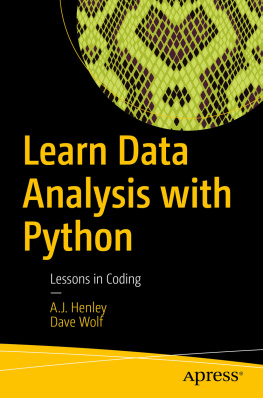
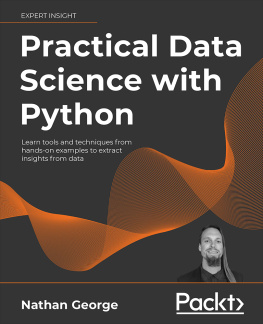
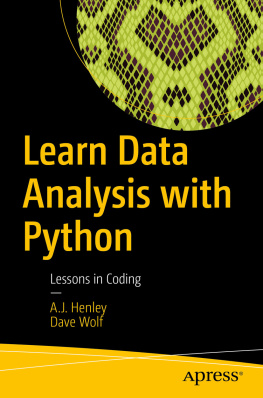
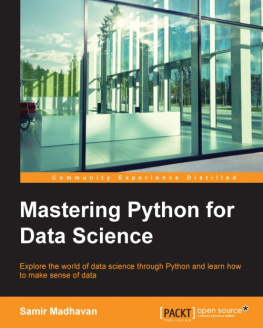
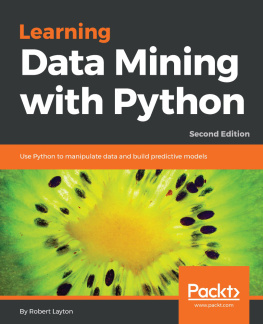
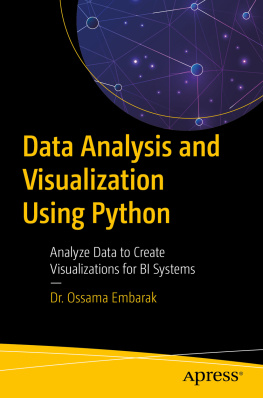
![Gopi Subramanian [Gopi Subramanian] - Python Data Science Cookbook](/uploads/posts/book/119589/thumbs/gopi-subramanian-gopi-subramanian-python-data.jpg)
